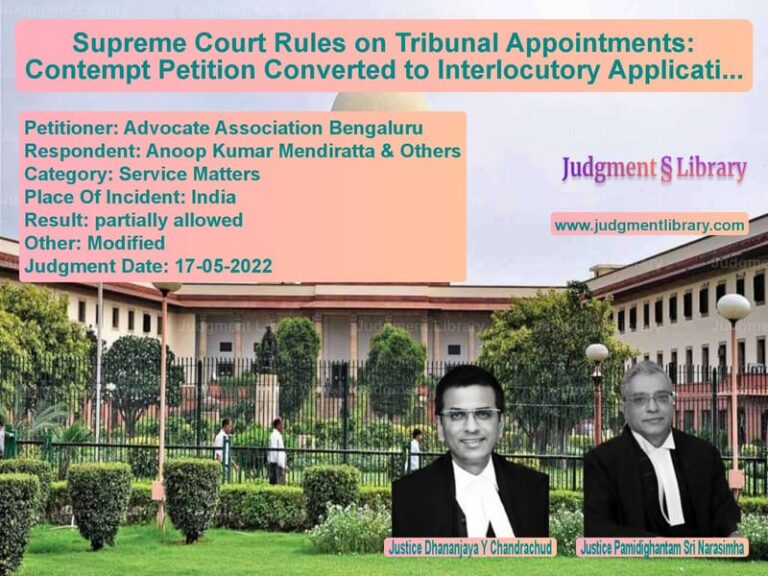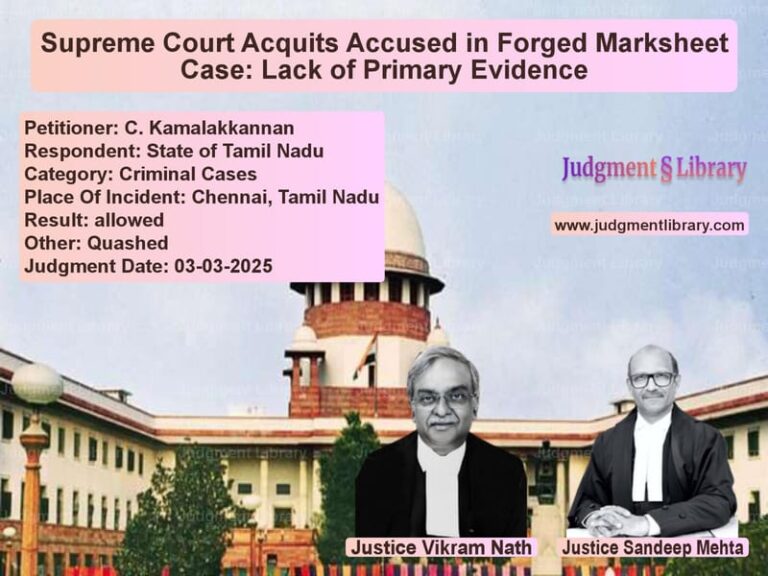Judicial Review on Law Commission Appointments and Legislative Directives: Union of India vs. K. Pushpavanam
The Supreme Court of India recently ruled on an important case concerning the appointment of the Law Commission and the power of courts to direct legislative action. The case, Union of India & Ors. vs. K. Pushpavanam & Ors., revolved around a writ petition that sought the appointment of members to the 22nd Law Commission and the introduction of legislation regarding liability in tort. The judgment, delivered by Abhay S. Oka and Sanjay Karol, addressed crucial constitutional questions regarding judicial overreach and the separation of powers.
Background of the Case
The case originated from a writ petition filed before the High Court of Madras at its Madurai Bench. The first respondent, K. Pushpavanam, had sought a writ of mandamus to direct the Central Government to appoint the Chairman and members of the 22nd Law Commission and to consider enacting a law on ‘Torts and State Liability.’ The petition specifically referenced previous Supreme Court decisions in MCD v. Uphaar Tragedy Victims Assn (2011) 14 SCC 481 and Vadodara Municipal Corporation v. Purshottam v. Murjani & Others (2014) 16 SCC 14, which had discussed the need for legislative intervention in matters of state liability.
Before the final hearing, the High Court posed several queries to the Union Government, including:
- How many times constitutional courts had recommended the enactment of new laws?
- How many such recommendations had been implemented?
- Whether a law addressing ‘Torts and State Liability’ was under consideration?
- Whether a dedicated wing existed to monitor judicial recommendations for legislative amendments?
- When the government planned to appoint the 22nd Law Commission members?
High Court’s Directions
Following arguments, the Madras High Court issued the following key directions:
- The Central Government was directed to consider introducing a bill on ‘Liability in Tort’ within six months.
- The government was instructed to decide within six months whether the Law Commission should be given statutory or constitutional status.
- More funds were to be allocated to the Law Commission for research and infrastructure.
- The Central Government was ordered to appoint the Chairman and members of the 22nd Law Commission within three months.
- Every government department was directed to appoint a nodal officer to monitor judicial recommendations for legislative action.
Arguments by the Appellants (Union of India)
Representing the Union of India, Additional Solicitor General Ms. Aishwarya Bhati argued that:
- The High Court’s directions amounted to judicial overreach, compelling the legislature to enact laws in a particular manner.
- Courts do not have the power to mandate the government to consider granting constitutional or statutory status to the Law Commission.
- The 22nd Law Commission had already been constituted via a notification dated November 9, 2022.
- The Central Government was already addressing judicial recommendations, and mandating nodal officers for each department was unnecessary.
Arguments by the Respondents
The respondents countered that:
- The directions issued by the High Court did not compel the legislature to act but merely suggested consideration of legal reforms.
- The power of constitutional courts to recommend legislation had been exercised previously in various cases.
- The appointment of nodal officers would help streamline the implementation of judicial recommendations.
Supreme Court’s Analysis
The Supreme Court carefully reviewed the arguments and held that while courts can make recommendations, they cannot issue binding directions compelling the legislature to enact a law. The Court emphasized:
“No Constitutional Court can issue a writ of mandamus to a legislature to enact a law on a particular subject in a particular manner. The Court may, at the highest, record its opinion or recommendation on the necessity of either amending the existing law or coming out with a new law.”
The Court ruled that:
- The directive to consider introducing a ‘Liability in Tort’ bill was unwarranted, as it encroached on legislative discretion.
- The order directing the government to decide on the Law Commission’s status was an overreach.
- Mandating the appointment of nodal officers was unnecessary, as government departments were already aware of judicial recommendations.
- However, the Court acknowledged the importance of adequate funding for the Law Commission and directed the government to consider any funding requests promptly.
Final Verdict
In its judgment, the Supreme Court:
- Set aside the High Court’s first, second, and fifth directions as unconstitutional.
- Modified the judgment, treating the High Court’s recommendations as advisory rather than binding.
- Instructed the Central Government to consider Law Commission funding requests without delay.
- Noted that the 22nd Law Commission had already been constituted, rendering part of the High Court’s ruling moot.
The Supreme Court’s decision clarifies the limits of judicial intervention in legislative matters, reinforcing the doctrine of separation of powers.
Petitioner Name: Union of India.Respondent Name: K. Pushpavanam & Ors..Judgment By: Justice Abhay S. Oka, Justice Sanjay Karol.Place Of Incident: Madras, Tamil Nadu.Judgment Date: 11-08-2023.
Don’t miss out on the full details! Download the complete judgment in PDF format below and gain valuable insights instantly!
Download Judgment: union-of-india-vs-k.-pushpavanam-&-ors-supreme-court-of-india-judgment-dated-11-08-2023.pdf
Directly Download Judgment: Directly download this Judgment
See all petitions in Constitution Interpretation
See all petitions in Legislative Powers
See all petitions in Public Interest Litigation
See all petitions in Judgment by Abhay S. Oka
See all petitions in Judgment by Sanjay Karol
See all petitions in allowed
See all petitions in Modified
See all petitions in supreme court of India judgments August 2023
See all petitions in 2023 judgments
See all posts in Constitutional Cases Category
See all allowed petitions in Constitutional Cases Category
See all Dismissed petitions in Constitutional Cases Category
See all partially allowed petitions in Constitutional Cases Category







